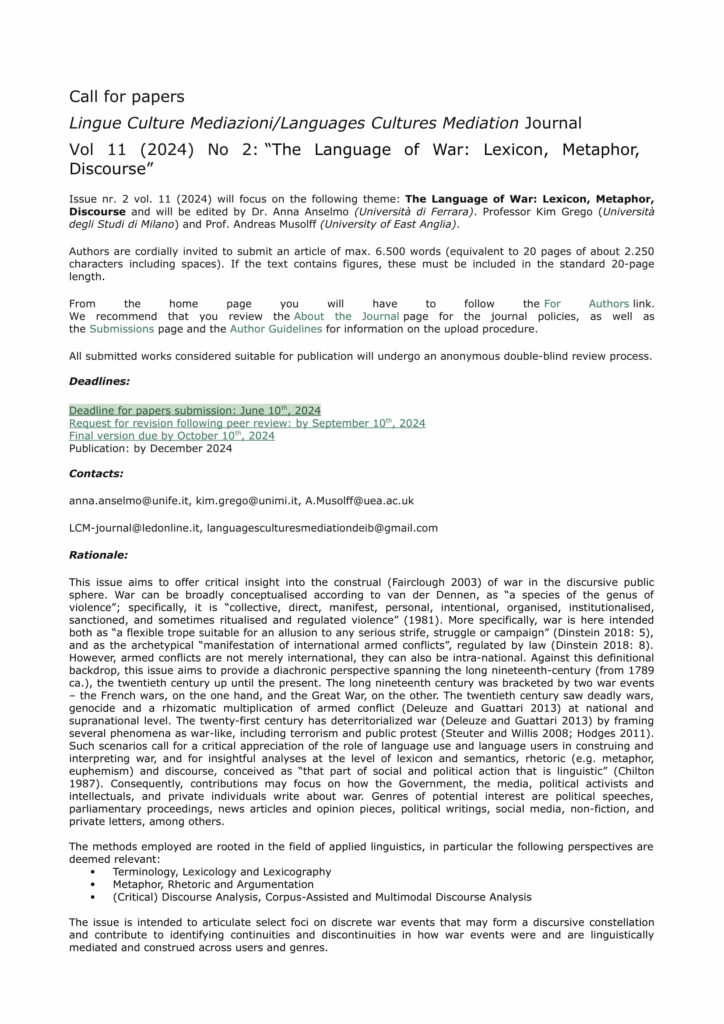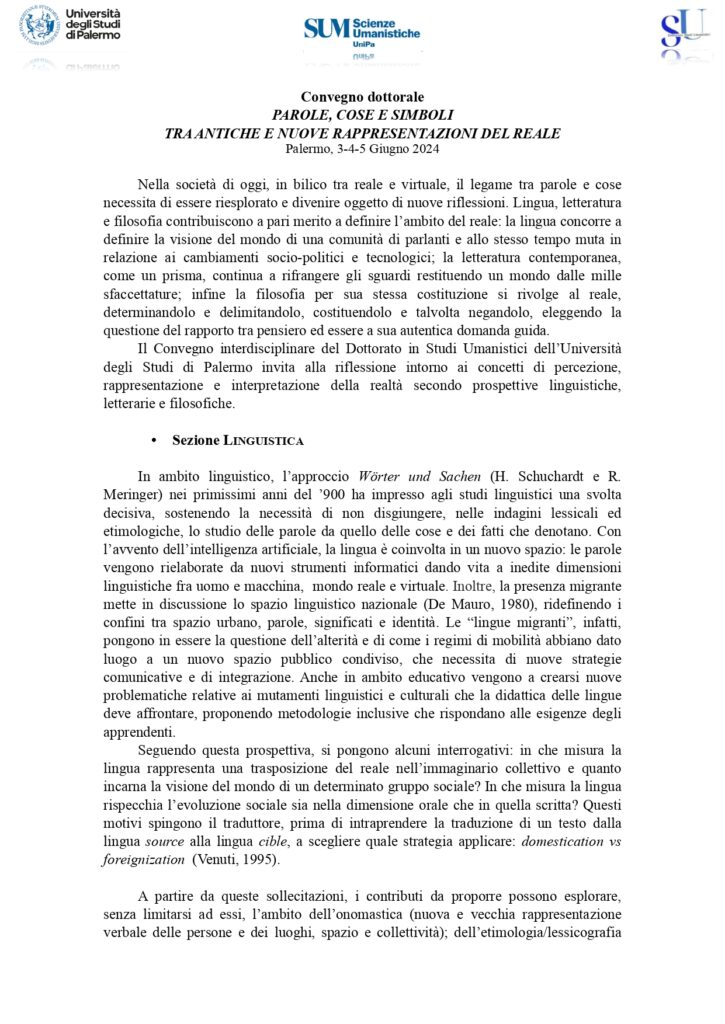CfP Lingue “Culture Mediazioni/Languages Cultures Mediation Journal”: “The Language of War: Lexicon, Metaphor, Discourse”
Call for papers Lingue Culture Mediazioni/Languages Cultures Mediation Journal Vol 11 (2024) No 2: “The Language of War: Lexicon, Metaphor, Discourse” Issue nr. 2 vol. 11 (2024) will focus on the following theme: The Language of War: Lexicon, Metaphor, Discourse and will be edited by Dr. Anna Anselmo (Università di Ferrara). Professor Kim Grego (Università degli Studi di Milano) and Prof. Andreas Musolff (University of East Anglia). Authors are cordially invited to submit an article of max. 6.500 words (equivalent to 20 pages of about 2.250 characters including spaces). If the text contains figures, these must be included in the standard 20-page length. From the home page you will have to follow the For Authors link.We recommend that you review the About the Journal page for the journal policies, as well as the Submissions page and the Author Guidelines for information on the upload procedure. All submitted works considered suitable for publication will undergo an anonymous double-blind review process. Deadlines: Deadline for papers submission: June 10th, 2024Request for revision following peer review: by September 10th, 2024Final version due by October 10th, 2024Publication: by December 2024 Contacts: anna.anselmo@unife.it, kim.grego@unimi.it, A.Musolff@uea.ac.uk LCM-journal@ledonline.it, languagesculturesmediationdeib@gmail.com Rationale: This issue aims to offer critical insight into the construal (Fairclough 2003) of war in the discursive public sphere. War can be broadly conceptualised according to van der Dennen, as “a species of the genus of violence”; specifically, it is “collective, direct, manifest, personal, intentional, organised, institutionalised, sanctioned, and sometimes ritualised and regulated violence” (1981). More specifically, war is here intended both as “a flexible trope suitable for an allusion to any serious strife, struggle or campaign” (Dinstein 2018: 5), and as the archetypical “manifestation of international armed conflicts”, regulated by law (Dinstein 2018: 8). However, armed conflicts are not merely international, they can also be intra-national. Against this definitional backdrop, this issue aims to provide a diachronic perspective spanning the long nineteenth-century (from 1789 ca.), the twentieth century up until the present. The long nineteenth century was bracketed by two war events – the French wars, on the one hand, and the Great War, on the other. The twentieth century saw deadly wars, genocide and a rhizomatic multiplication of armed conflict (Deleuze and Guattari 2013) at national and supranational level. The twenty-first century has deterritorialized war (Deleuze and Guattari 2013) by framing several phenomena as war-like, including terrorism and public protest (Steuter and Willis 2008; Hodges 2011). Such scenarios call for a critical appreciation of the role of language use and language users in construing and interpreting war, and for insightful analyses at the level of lexicon and semantics, rhetoric (e.g. metaphor, euphemism) and discourse, conceived as “that part of social and political action that is linguistic” (Chilton 1987). Consequently, contributions may focus on how the Government, the media, political activists and intellectuals, and private individuals write about war. Genres of potential interest are political speeches, parliamentary proceedings, news articles and opinion pieces, political writings, social media, non-fiction, and private letters, among others. The methods employed are rooted in the field of applied linguistics, in particular the following perspectives are deemed relevant: The issue is intended to articulate select foci on discrete war events that may form a discursive constellation and contribute to identifying continuities and discontinuities in how war events were and are linguistically mediated and construed across users and genres. Keywords: Corpus-Assisted Discourse Studies, (Critical) Discourse Analysis, Multimodality, Terminology, Historical Lexicography, War, Conflict. Bibliography Blaxill, L. (2020). The War of Words: The Language of British Elections 1880-1914. Boydell & Brewer. Chilton, P. (1987). Metaphor, Euphemism and the Militarization of Language. Current Research on Peace and Violence, 10(1), 7–19. https://www.jstor.org/stable/40725053 Chilton, P. A. (Ed.). (1998). Political Discourse in Transition in Europe 1989 – 1991. Benjamins. Deleuze, G., Guattari, F., & Massumi, B. (2013). A Thousand Plateaus: Capitalism and Schizophrenia. Bloomsbury Academic. Dinstein, Y. (2018). War, Aggression, and Self-Defence, 6th Edition. Cambridge University Press. Fairclough, N. (2003). Analysing Discourse: Textual Analysis for Social Research. Routledge. Hayes, N., & Hill, J. (Eds.). (1999). Millions Like Us?: British Culture in the Second World War (DGO-Digital original). Liverpool University Press. https://www.jstor.org/stable/j.ctt5vjdhc Heer, H. et al. (Eds.). (2008). The Discursive Construction of History: Remembering the Wehrmacht’s War of Annihilation. Palgrave Macmillan. Hodges, A. (2011). The “War On Terror” Narrative: Discourse and Intertextuality in the Construction and Contestation of Sociopolitical Reality. Oxford University Press. Hodges, A. (2015). War Discourse. In K. Tracy, T. Sandel, & C. Ilie (Eds.), The International Encyclopedia of Language and Social Interaction (1st ed., pp. 1–6). Wiley. https://doi.org/10.1002/9781118611463.wbielsi026 Jackson, R. (2005). Writing the War on Terrorism: Language, Politics, and Counter-Terrorism. Manchester University Press. Kelly, M., Footitt, H. & Salama-Carr, M. (Eds.). (2019). The Palgrave Handbook of Languages and Conflict. Palgrave Macmillan. Kennedy, C. (2013). Narratives of The Revolutionary and Napoleonic Wars: Military and Civilian Experience in Britain and Ireland. Palgrave Macmillan. Pratt, M. L. (2009). Harm’s Way: Language and the Contemporary Arts of War. PMLA/Publications of the Modern Language Association of America, 124(5), 1515–1531. https://doi.org/10.1632/pmla.2009.124.5.1515 Russell, G. (1995). The Theatres of War: Performance, Politics, and Society, 1793-1815. Clarendon Press ; New York : Oxford University Press. Steuter, E., & Wills, D. (2008). At War with Metaphor: Media, Propaganda, and Racism in the War On Terror. Lexington Books. Thorne, S. (2006). The Language of War. Routledge. Walker, J., & Declercq, C. (Eds.). (2021). Multilingual Environments in the Great War. Bloomsbury Academic.


